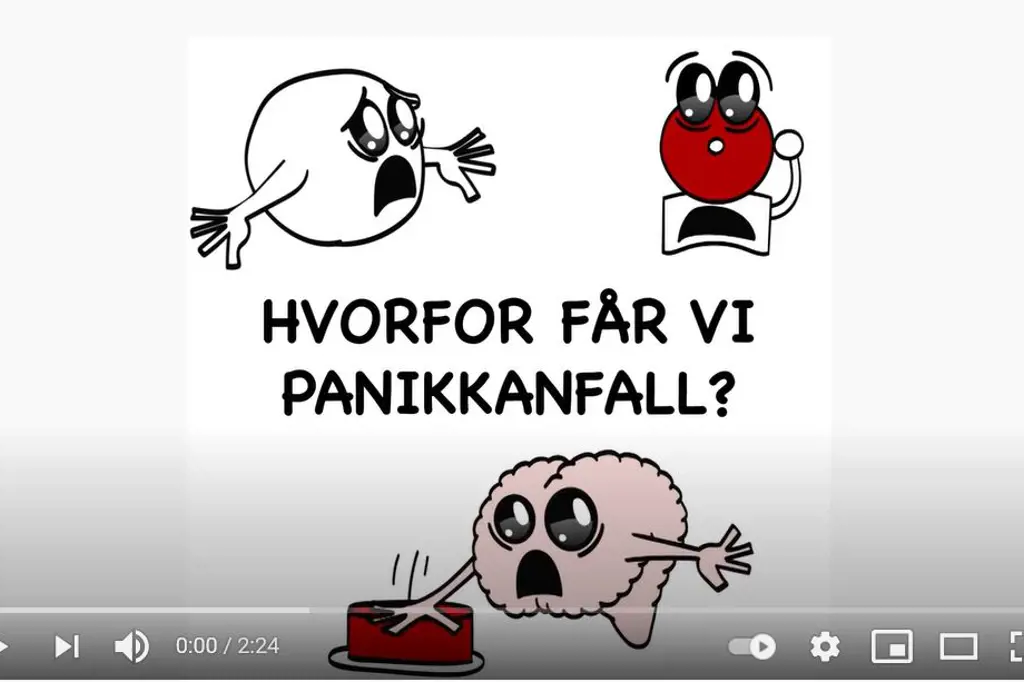Films
On this page, you will find several short films that can be used in the VIP Programme implementation, as well as some longer films for an in-depth study. The films are taken from many different sources, which is why we can only link to them and cannot make them available for download.
Note that the majority of the movies on this page are in norwegian, but you can enable captions for many different languges on most YouTube movies.
SHORT FILMS
The animated WHO film called Black Dog provides a very valuable and occasionally humorous description of depression. It also contains many good tips on how to get better.
You can find exercises for this film here, under “Exercises for Films”
The film “Trial and Error” is based on the tool Psychological First Aid and visualises red and green thoughts using the example of a Vg1 student in a test situation.
You can find exercises for this film here, under “Exercises for Films”
A short film about the feeling of not being good enough, the importance of talking to someone, and a concrete tool for sorting one’s thoughts.
A short film about the experience of stress and anxiety by young people. The film shows both the importance of sharing your problems and the ways in which friends can be supportive through empathy and acknowledgement. The film can be linked to the VIP exercise in Norwegian, “Best at Everything”.
This short film compares having sex with drinking tea. It is a humorous animation film that shows what consent is really about. We have a special exercise for this film linked to the subject of Religion and Ethics/Christian and Other Religious and Ethical Education.
This short film is made by the Norwegian Directorate for Children, Youth, and Family Affairs (Bufdir). It shows what being a child of parents who struggle with illness or substance abuse might look like. It can be a good introduction to the topic of being the next of kin as a child and can be linked to the corresponding text on this topic in the student booklet.
The adolescent brain undergoes many changes and differs from both the adult brain and the child’s brain. In this film, well-known psychiatrist Daniel Sigel explains the two most important changes that occur in the adolescent brain, focusing on how adults can best support the development of adolescents.
The adolescent brain undergoes many changes and differs from both the adult brain and the child’s brain. This film by the University of California explains in a simple and funny way how the adolescent brain evolves, and at the same time points out that it may have some real benefits in several areas. The film is suitable for the students to watch.
This film by the Norwegian Centre for Violence and Traumatic Stress Studies (NKVTS), shows what psychotherapy is and who it may be relevant for, as well as gives some practical information about therapy sessions, confidentiality, and the use of an interpreter. The film is also available in English, Arabic, Somali, and Tigrinya on the NKVTS website. Note: Mental healthcare treatment for young people under the age of 18 is free, which is not mentioned in the film.
This is actually a commercial for Danish TV2, and it is a really good way to show what we all have in common. The idea of the video is similar to the Four-Corner-Exercise, which we explain in our exercise booklet for the VIP Partnership. The video can be a good starting point for a conversation about belonging to a community, loneliness, norms, and forming groups. It can also demonstrate how easily we can interpret others based only on what we see.
The film about Kjetil has become a VIP Programme classic and is still popular among some teachers.
In this film, Dr. Brené Brown explains the difference between empathy and sympathy, and how genuine empathy demands that we dare to come into contact with our own vulnerable feelings.
“Alfred and the Shadow” is a short film about emotions. It can be used as an introduction to our group activity devoted to emotions which you can find on our page Exercises, under General Exercises.
You can find the exercises for the film here
This film shows how our inner critic can make us feel ashamed of who we are, lonely, and depressed. The film can be use as an extra activity for the exercise devoted to emotions or the exercise about red and green thoughts, which you can find under General Exercises.
You can find the exercises for the film here
The film “Stand Up!” focuses on identity-bullying and demonstrates the idea that the majority in the class have power over the bullies who are the minority. The film can be shown in connection with the chapter “Life at School” in the student booklet.
FILMS FOR IN-DEPTH STUDY
In this film, people talk about what it feels like to have depression and how cognitive therapy contributes to a better life. The film is made by the Norwegian Association for Cognitive and Behavioral Therapy.
Tankens kraft - Behandling av depresjon med kognitiv terapi - YouTube
In this film, two young girls talk about having lived with a social anxiety disorder, and what helped them get better.
Kognitiv terapi ved sosial angstlidelse - Tankens kraft - YouTube
This film by the Norwegian Association for Cognitive and Behavioral Therapy provides a good introduction into psychosis disorders for those who would like to learn more on this topic. Marte, who is one of the people you meet in the film, is also interviewed in our student booklet.
Tankens kraft - Kognitiv terapi ved psykoselidelser - YouTube
The purpose of this film is to promote openness around suicide and suicidal thoughts. The film is made by the Red Cross and the Norwegian Organization for Suicide Survivors, LEVE.
Other languages

